
How to Cancel Order on Shopify (Step-by-Step Guide)
Learning how to cancel Shopify order is important for every store owner. Whether it’s a customer request, an inventory mistake, or a suspicious order, knowing the right steps helps you save time and avoid bigger issues.
In this guide, you’ll learn:
- Understanding order cancellation in Shopify
- Step-by-step instructions to cancel orders manually and in bulk
- How to use Shopify Flow to automate cancellations
- How customers can cancel orders on Shopify stores
- Best practices to handle cancellations smoothly
Let’s get started!
Understanding Order Cancellation in Shopify
Before you start canceling orders, it’s important to understand how cancellation works in Shopify and how it differs from other actions like refunds or deleting orders. This helps you avoid mistakes and manage both customers and inventory properly.
What is cancel vs refund vs delete?
On Shopify, these three actions often get confused, but they serve different purposes:
| Action | What it means | When to use it | Key notes |
| Cancel | Stops order processing and allows you to choose refund/restock options | When the order hasn’t been fulfilled yet | Cancellation is recorded in the order timeline |
| Refund | Returns money to the customer (full or partial) | When items are returned or order changes after payment | Refunds can happen without canceling the order |
| Delete | Permanently removes an order from Shopify Admin | Only possible for draft, test, or imported orders | Deleted orders can’t be recovered or tracked in reports |
So all in all, you can understand like, cancel stops an order, refund gives money back, and delete wipes it from your system.
Note: In many cases, canceling an order is not the only option. If the issue is minor such as a delayed shipment, partial inventory adjustment, or customer confirmation continuing with fulfillment may still be the better choice. Understanding how the fulfillment process works helps you decide whether to cancel, refund, or simply proceed with shipping. For a full walkthrough of fulfillment methods, statuses, and best practices, you can refer to our guide on how to fulfill orders on Shopify.
When should you cancel an order on Shopify?
You should cancel an order in Shopify when continuing with fulfillment would create problems for your store or the customer. Common situations include:
- A buyer reaches out shortly after checkout asking to stop the order.
- The product is unavailable or inventory was oversold.
- The order contains incorrect items, shipping address, or pricing errors.
- The order is flagged as high-risk or looks suspicious.
- The delivery time is longer than the customer is willing to wait.
In short, canceling an order when fulfilling it would cause more issues than benefits.
Shipping-related issues are also a common reason for order cancellations. This includes unexpected shipping costs, unavailable shipping methods, or delivery timelines that don’t meet customer expectations.
If cancellations happen frequently due to shipping confusion, it’s a sign that your shipping setup may need adjustment. Understanding how rates, zones, and carrier calculations work can help prevent these issues in the first place. You can learn more in our breakdown of how Shopify shipping works.
What happens after you cancel an order on Shopify?
When you cancel an order, Shopify updates the order status and records the changes in the timeline. Here’s what typically happens next:
- The payment status changes. Depending on the refund option, the order is marked as Voided, Refunded, or Partially refunded.
- Items are restocked if selected. Any canceled products return to your available inventory if you choose the restock option.
- The order remains recorded for reference. The cancellation details stay visible in Shopify Admin so that you can review them anytime.
- You can archive or delete the order as a follow-up action. Archiving keeps your open orders clean, while deleting (only for specific order types) removes them permanently.
These outcomes ensure that your payments, inventory, and records all stay accurate after a cancellation.
You can also check how this appears to customers on the Shopify order status page.
How to Cancel Shopify Order Manually
Canceling an order manually is the most common way to stop fulfillment. It only takes a few clicks in the Admin, and you can decide how refunds and inventory are handled.
Step 1: Go to Orders in Shopify Admin
Log in to your Shopify Admin dashboard. From the left-hand navigation menu, click Orders to open the full list of orders placed in your store.

Step 2: Open the order details
Scroll or search to find the order you want to cancel. Click the order number to open its details page, where you’ll see customer information, products purchased, and payment status.
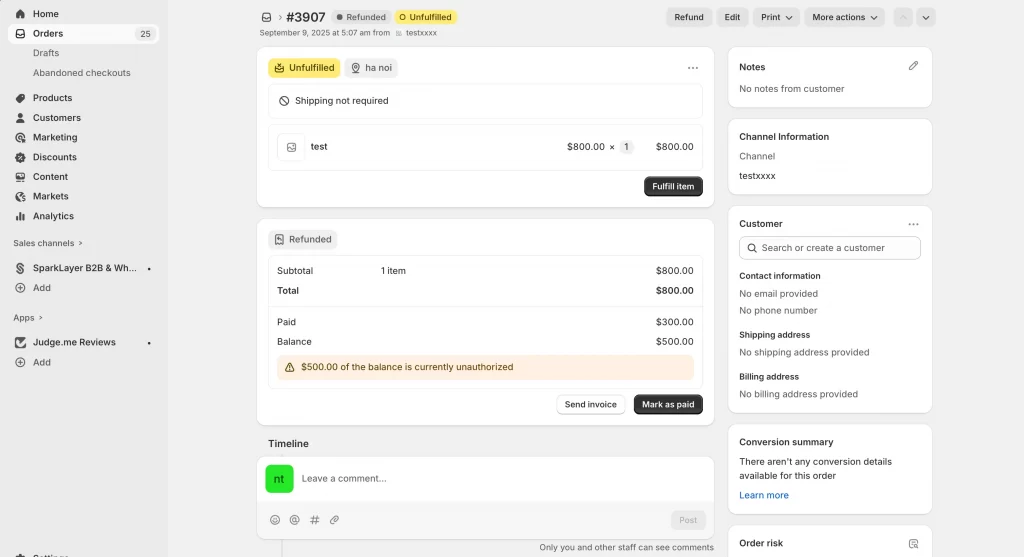
Step 3: Click More actions > Cancel order
In the order details page, look at the top-right corner. Click More actions (1), then select Cancel order (2) from the dropdown menu. This will open the cancellation options.
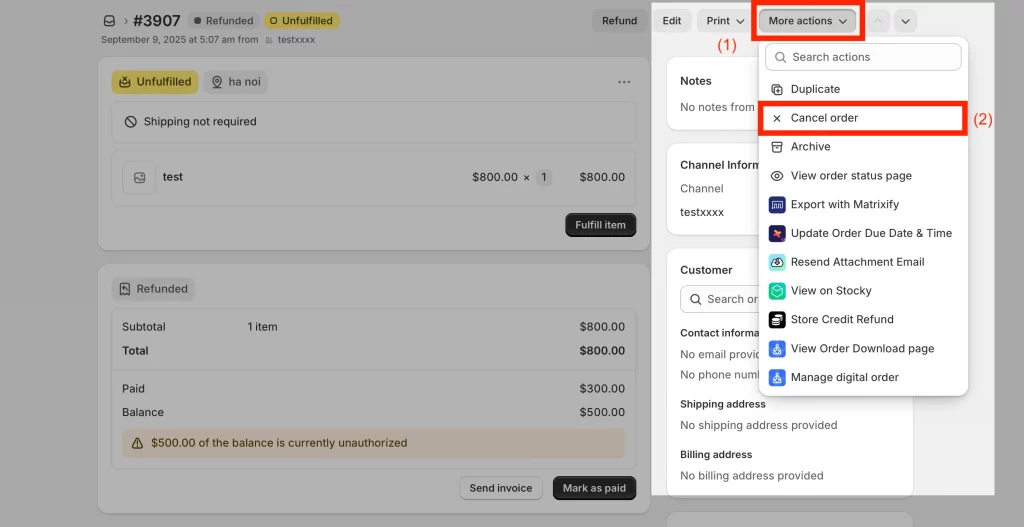
Step 4: Choose refund and restock options
In the Refund payment section, decide how you want to handle the payment:
- Refund now to issue the money back immediately.

- Refund later if you want to process the refund manually at another time.

You can also select whether the items should be restocked in your inventory, and pick a reason for cancellation from the dropdown menu.
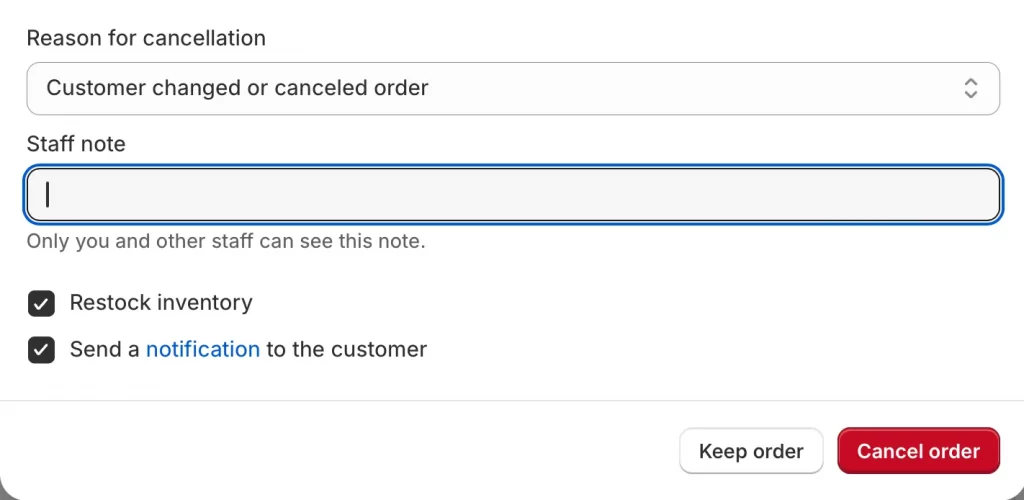
Step 5: Confirm and notify the customer
After reviewing your selections, click Cancel order to finalize. You can also check the box to send a notification to the customer, so they know their order has been canceled and whether a refund has been issued. And that’s how to cancel an order on Shopify!
Note: You can’t cancel orders that are already fulfilled, handled by a third-party fulfillment app, or restricted by staff permissions. In these cases, you may need to cancel fulfillment first, issue a refund, or work through your fulfillment partner.
How to Cancel Shopify Order in Bulk
If you need to cancel several orders at once, Shopify lets you use a bulk action from the Orders page. This saves time, but you should be careful with refund settings because not all options are available in bulk mode.
Step 1: Select orders via checkboxes
In your Shopify Admin, go to Orders. Use the checkboxes beside each order to select all the orders you want to cancel at once.

You can select up to 250 orders in a single bulk action.
Step 2: Click … > Cancel orders
After selecting the orders, click the … (More actions) (1) menu at the top of the orders list. From the dropdown, choose Cancel orders (2) to start the bulk cancellation process.
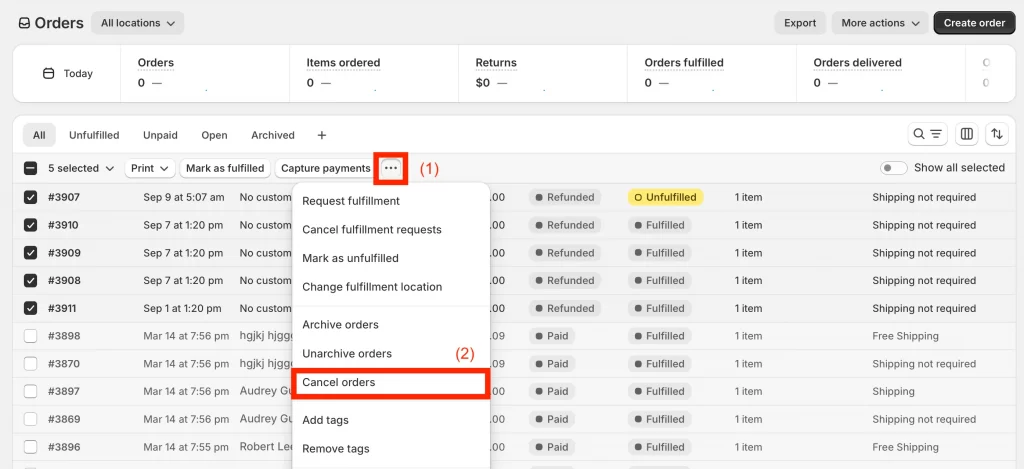
Step 3: Choose refund option
In the Refund payment section, decide how refunds will be handled for these canceled orders:
- Refund to original payment method: Issues a full refund back to the customer’s card or account.
- Refund later: No immediate refund; you’ll need to process it manually afterward.
- Refund to store credit: Adds the refunded amount to the customer’s account as store credit (requires permission).
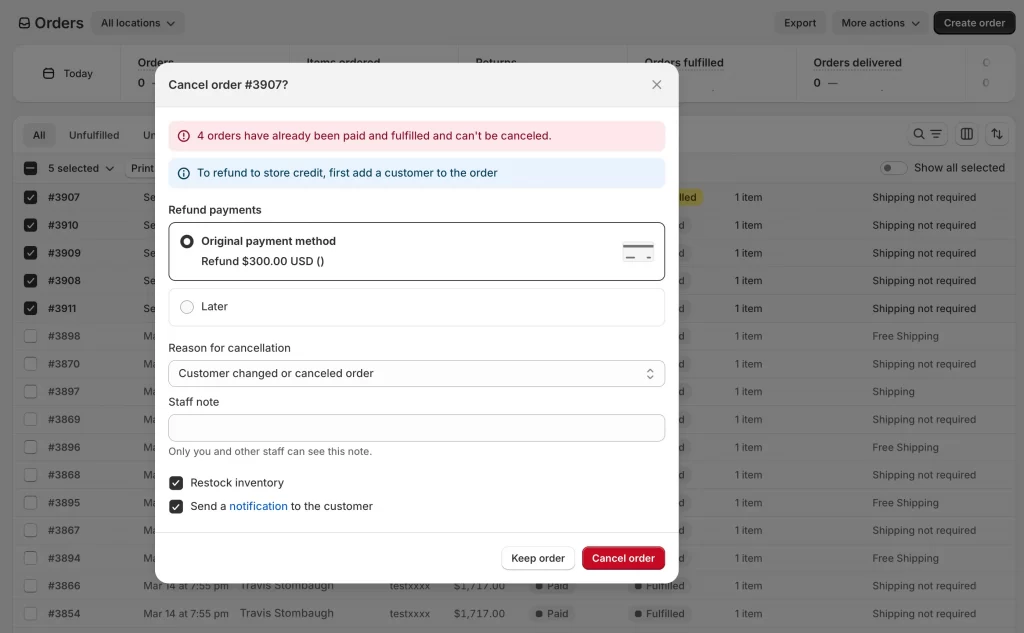
Note: When canceling multiple orders in bulk, Shopify automatically skips orders that can’t be canceled (for example, orders already paid and fulfilled). You’ll see a warning message in the popup. Also, be aware that in some bulk cases, refunds are issued immediately and you won’t have the option to delay them.
Step 4: Add reason, notes, and confirm
Now, select a reason for cancellation from the dropdown list.
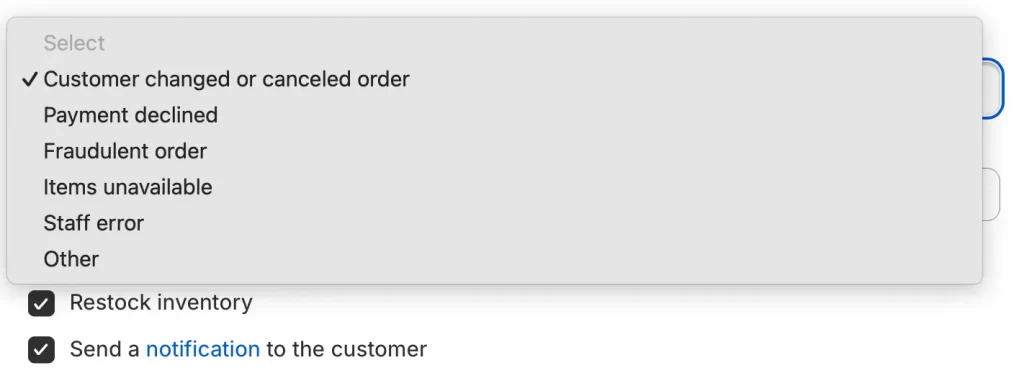
Optionally, you can add an internal staff note for tracking purposes, choose whether to restock the items, and decide if customers should receive a cancellation notification. Finally, click Cancel orders to complete the process.
Caution: Bulk canceling always processes refunds immediately in some cases, and you won’t see the “Refund later” option. If you need more control over refunds, cancel orders individually instead.
How to Automate Cancellations with Shopify Flow
Shopify Flow allows you to set up automated workflows that cancel orders under specific conditions. This helps you save time, reduce fraud, and keep operations consistent. Here’s how to set it up:
Step 1: Add the “Cancel order” action in workflow
In Shopify Flow, create a new workflow.
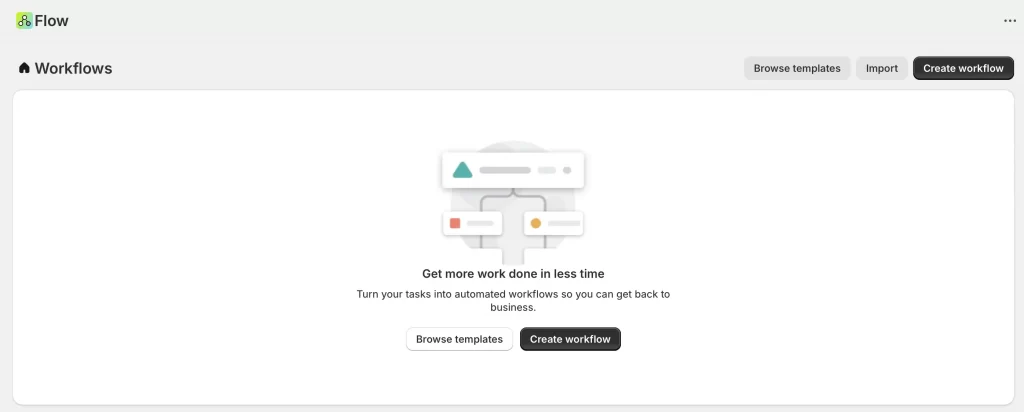
Step 2: Set triggers (fraud, high-risk orders, frequent returns)
Decide when the cancellation should happen. Common triggers include:
- High-risk flagged orders (fraud detection)
- Frequent returners who often send items back
- Excessive daily orders from the same customer (possible spam or abuse)
Step 3: Configure refund, restock, and notifications
Within the cancel action, choose whether to:
- Refund automatically to the original payment method or store credit
- Restock items back into your inventory
- Send a cancellation notification to the customer
- Add a staff note for internal tracking
Step 4: Save and test workflow
After setting up the workflow, save it and run a test to ensure it works as expected. Review order logs to confirm that orders meeting your criteria are canceled, refunded, and restocked correctly.
So here’s an example of how to cancel high-risk orders automatically on Shopify.
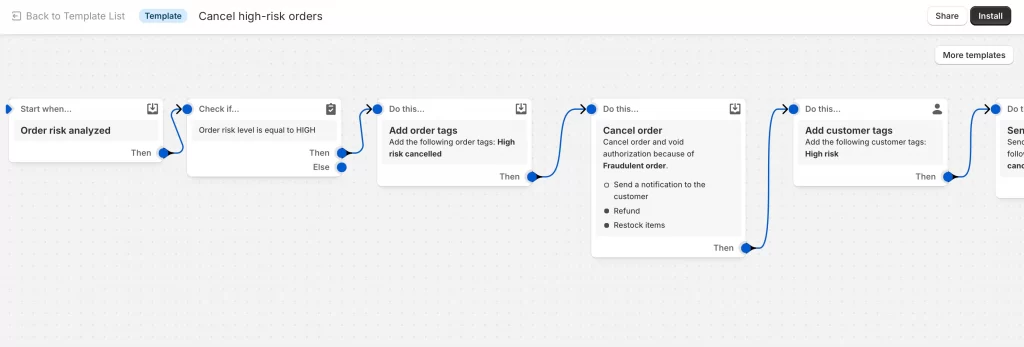
A common automation is canceling orders that Shopify flags as high risk. In this Flow template:
- The workflow starts when an order risk is analyzed.
- It checks if the order risk level is High.
- If true, the workflow:
- Tags the order as High risk cancelled
- Cancels the order and voids authorization
- Refunds the payment and restocks items
- Tags the customer as High risk for tracking
This ensures fraudulent orders are caught and canceled automatically, saving you time and protecting your business.
From our experience at LitOS, merchants often get the most value by extending this same logic beyond fraud checks, for example, flagging frequent returners, spotting bulk order abuse, or combining Flow with third-party fraud apps. The goal is to build workflows that fit your store’s unique risks while keeping the cancellation process consistent and efficient.
How Customers Can Cancel Orders on Shopify Stores
By default, Shopify doesn’t let customers cancel their orders directly after checkout. There’s no built-in “Cancel order” button in the customer account or confirmation email.
If a buyer wants to cancel, they usually need to contact the store owner or support team as soon as possible. The merchant can then cancel the order from their Shopify Admin and issue a refund if the order hasn’t been fulfilled yet.
Some stores customize their setup by adding a cancel option through code or third-party apps. In that case, customers may see a “Request cancellation” button inside their account page, which sends a cancellation request to the merchant. However, this feature depends entirely on how the individual store is configured.
Note: Shopify doesn’t encourage giving customers a direct cancel option because it can increase the risk of misuse or chargebacks. Having the merchant handle cancellations ensures that refunds and inventory are managed correctly.
Best Practices for Shopify Cancel Order
Handling cancellations the right way helps you maintain good customer relationships while protecting your store from losses. Here are some best practices on how to cancel Shopify order to follow:
- Communicate quickly with customers when an order is canceled.
- Always issue refunds promptly to avoid disputes or chargebacks.
- Restock items immediately to keep inventory accurate.
- Use notes or tags to track reasons for cancellations.
- Consider using Shopify Flow or apps to automate cancellations for fraud or high-risk orders.
Actually, cancellations are never ideal, but with the right approach, they can be handled smoothly without hurting your brand.
At LitOS, we help Shopify merchants go beyond the basics: from automating cancellations of high-risk orders to setting up smarter workflows that cut down on errors and save time. If you’re ready to simplify how your store manages orders from checkout to fulfillment, our team is here to help.
Ready to streamline your Shopify operations? Talk to us today →
How to Cancel Shopify Order: FAQs
Can I cancel an order before it is delivered?
Yes. You can cancel any order that hasn’t been fulfilled. Once items are shipped, the cancel option disappears at that point you need to process a return and refund. Canceling early saves you shipping and restocking costs.
Can customers cancel their order on Shopify?
No. Shopify doesn’t give customers a cancel button. They must contact the store owner, who decides whether to cancel. Some merchants add a cancel request option with apps or custom code, but Shopify discourages this because of the risk of misuse and chargebacks.
How do I cancel a draft order in Shopify?
Draft orders can’t be canceled, only deleted. Open the draft in Admin, click More actions > Delete, and it’s gone permanently. Unlike canceled orders, deleted drafts aren’t stored for reference.
How easy is it to cancel on Shopify?
Open the order, click More actions > Cancel order, then pick your refund and restock options. But not every order is eligible fulfilled orders, third-party managed orders, or some sales channel orders may require refunds or returns instead.
Final Words
In this article, you have just learned how to cancel a Shopify order or multiple orders at once. Order cancellations can feel like a setback, but handled the right way; they build trust instead of frustration. If you’re looking to streamline not just cancellations but your entire Shopify workflow, tools like Shopify Flow and expert support can make the process seamless.
Get your Shopify order management set up the right way.
At LitOS, we help merchants configure orders, cancellations, and refunds so everything flows smoothly from checkout to fulfillment. With the right setup, you’ll save time, reduce errors, and avoid costly chargebacks.
TALK TO SHOPIFY EXPERTS
